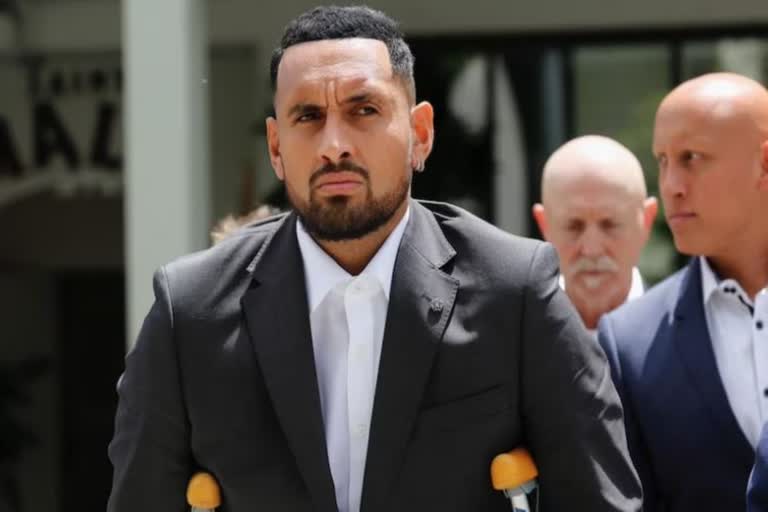Canberra: Nick Kyrgios had suffered severe depression, suicidal ideation and insomnia in the past, a psychologist told a court on Friday when the Australian tennis star pleaded guilty to pushing a former girlfriend to the ground two years ago. The 2022 Wimbledon runner-up pleaded guilty in the Australian Capital Territory Magistrates Court to assaulting Chiara Passari during an argument in his hometown of Canberra in January 2021.
Magistrate Jane Campbell didn't record a conviction against Kyrgios for reasons including that the offense was at the low end of seriousness for a common assault, and was not premeditated. Campbell described it as an act of "stupidity" and "frustration."
Kyrgios, who was using crutches following recent surgery on his left knee, didn't speak to reporters as he left court but issued a statement through a management company. "I respect today's ruling and am grateful to the court for dismissing the charges without conviction," Kyrgios said.
Read: Australia gets 'Ashwin duplicate' to train ahead of Test series against India
"I was not in a good place when this took place and I reacted to a difficult situation in a way I deeply regret. I know it wasn't OK and I'm sincerely sorry for the hurt I caused. "Mental health is tough. Life can seem overwhelming. But I've found that getting help and working on myself has helped me to feel better and to be better."
Kyrgios' psychologist, Sam Borenstein, said in a written report and testimony by phone that Kyrgios had suffered major depressive episodes in the past and had used alcohol and drugs to cope. Kyrgios' mental health led to impulsive and reckless behavior.
His recent knee injury had resulted in mild to moderate symptoms of depression, but his mental health was improving, Borenstein said. "He's doing very well," Borenstein said. "His mental health has improved significantly." Lawyers for Kyrgios had sought to have an assault charge stemming from events two years ago dismissed on mental health grounds but the application was unsuccessful. Kyrgios had been attempting to leave Passari during an argument at 10 p.m. on Jan. 10, 2021, outside her apartment in the inner-Canberra suburb of Kingston. He called an Uber but Passari stood in the way of him closing the front passenger side door. The driver wouldn't leave with the door open.
Kyrgios eventually pushed Passari's shoulders backward with open palms, causing her to fall to the pavement and graze her knee, according to agreed facts read to the court. Passari signed a police statement alleging the assault 11 months later, after her relationship with Kyrgios had ended.
Read: Messi has doubts about playing 2026 World Cup at age 39
His current partner, Costeen Hatzi, wrote in a character reference that she had no concerns of violence in her relationship. Hatzi was among Kyrgios' supporters who sat behind him in court. Kyrgios, wearing a dark suit and using the crutches for support, first spoke in court when the magistrate asked him if he could stand to enter a plea.
Kyrgios replied: "Yep, no worries, Your Honor," as he rose to plead guilty. In February last year, Kyrgios opened up about his performance at the 2019 Australian Open, saying what appeared to be a positive time in his life had been one of my darkest periods.
"I was lonely, depressed, negative, abusing alcohol, drugs, pushed away family and friends," he wrote on Instagram. "I felt as if I couldn't talk or trust anyone. This was a result of not opening up and refusing to lean on my loved ones and simply just push myself little by little to be positive."
Kyrgios made further references to his mental health struggles during his runs last year to the final at Wimbledon and the quarterfinals at the US Open. After ending Daniil Medvedev's US Open title defense last September to reach the quarterfinals, Kyrgios expressed pride at lifting himself out of "some really tough situations, mentally" and "some really scary places" off the court.
The 27-year-old Kyrgios had a career setback last month when he withdrew from the Australian Open because the knee injury which later required arthroscopic surgery. (AP)



